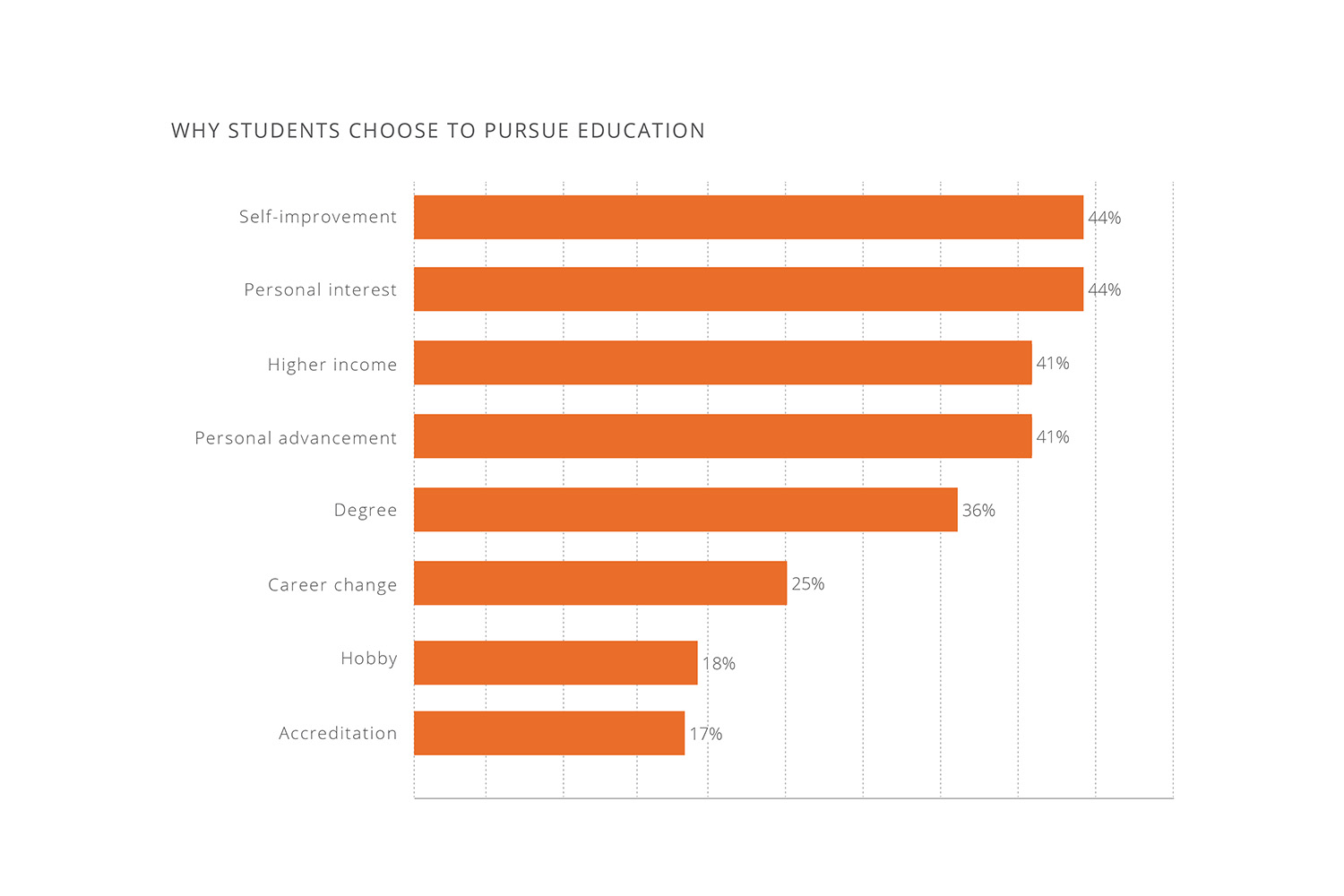Sign up for our LAVY email
and get our bi-monthly newsletter.
This article is a brief abstract of our exclusive study that takes the guesswork
out of education advertising and marketing.
Download LAVIDGE Education Marketing Research and Insights, Volume 1.
No college degree or career and technical education program is one-size-fits-all, and neither are the reasons why students decide to enroll. However, one chord rang true among those who responded to our survey for “LAVIDGE Education Marketing Research and Insights, Volume 1.” From becoming their best selves to improving their careers or levels of income, everyone expressed interest in pursuing higher education, vocational education or post-secondary education in hopes of making a change for the better.
 You might be surprised to learn that study respondents ranked both self-improvement and personal interest (tied at 44% each) slightly higher than increasing their income or advancing their career (tied at 41%) as reasons to enroll in school. Clearly, potential students want their educational pursuits to reflect themselves beyond how it will impact them during the workday and for student success to mean more than impacting their ability to pay their bills.
You might be surprised to learn that study respondents ranked both self-improvement and personal interest (tied at 44% each) slightly higher than increasing their income or advancing their career (tied at 41%) as reasons to enroll in school. Clearly, potential students want their educational pursuits to reflect themselves beyond how it will impact them during the workday and for student success to mean more than impacting their ability to pay their bills.
A quarter of our education industry marketing report respondents attributed their interest in higher education to a career change. Respondents didn’t specify whether the anticipated career changes were due to outside forces or simply related to personal choice. With many jobs being phased out of today’s market and more anticipated to be replaced by technological advance in the future, it’s no surprise.
An AARP report in early 2019 identified “Six careers worth going back to school for—even if you’re over age 40” including industrial-organizational psychologist, personal financial advisor, training and development specialist, recreational therapist, medical records and health information technician, and psychiatric technician. Associated careers pay average salaries between $28,000 and $94,720 per year.
Slightly fewer education industry study respondents (18%) indicated hobbies as their motivation to enroll. An example might be going back to school for a Master of Arts or Master of Fine Arts by studying puppetry at University of Connecticut. For those with an interest in learning to become a licensed auctioneer, Harrisburg Area Community College (HACC) in central Pennsylvania offers a vocational diploma program just for you. Credit is transferable to an associate degree at the school. Theater, dance and the performing arts are also hobbies that can be pursued as a degree, with The Julliard School in New York topping the list of places to enroll.

Different life stages offer different motivations for those pursuing their education. Culinary Arts might appeal to someone focused on pursuing a passion. Another student more motivated by a potential starting salary might choose a degree in high demand such as mechanical, chemical or petroleum engineering, even though it is less personally fulfilling.
Here’s what we found:
Income level has a similar effect on educational preferences. Respondents with salaries between $35k and $49k chose:
Retired respondents are most likely to choose degrees they simply find interesting:
The most preferred college major for women in the United States is nursing, and 87% of those who graduate in the field are female, according to a Team College Factual report published in 2017. The same report found that business administration and management is the most preferred college major for men.
Our education industry marketing research found that half of the female respondents in southwestern states prefer personal interest education, ranking it more favorably by a margin of 15 percentage points (50%) over males (35%).
In addition, respondents under 35 years of age (35%) and those with incomes <$35k/annually (30%) chose a career change more than respondents in older age groups and those with higher incomes.
Sign up for our LAVY email
and get our bi-monthly newsletter.